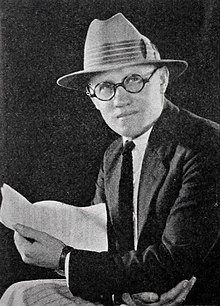| This article needs additional citations for verification. Please help improve this article by adding citations to reliable sources. Unsourced material may be challenged and removed. Find sources: "Gus Meins" – news · newspapers · books · scholar · JSTOR (November 2018) (Learn how and when to remove this message) |
| Gus Meins | |
|---|---|
 From a 1925 magazine From a 1925 magazine | |
| Born | Gustave Peter Ludwig Luley (1893-03-06)March 6, 1893 Frankfurt, Germany |
| Died | August 1, 1940(1940-08-01) (aged 47) La Crescenta, California, US |
| Occupation | Film director |
| Years active | 1922 - 1940 |
Gus Meins (March 6, 1893 – August 1, 1940), born Gustave Peter Ludwig Luley, was an American film director. He was born in Frankfurt, Germany.
Career
Meins started out in the ‘teens as a cartoonist for the Los Angeles Evening Herald before becoming a comedy writer for Fox Film in 1919.
In the 1920s, Meins directed a number of silent short subjects film series for Universal Pictures, including the Buster Brown comedies. He is best known as senior director of Hal Roach's Our Gang comedies from 1934 to 1936, and also as director of Laurel and Hardy's Babes in Toyland (1934). His assistant director was a young Gordon Douglas, who became senior director in 1936 when Meins left Our Gang for other directing jobs at Roach. Meins left Roach in 1937 over creative differences.
Death
In the summer of 1940, Meins faced prosecution on "morals charges", having been accused of sex offenses against six youths. The director swore his innocence but stated that the case would ruin his career, regardless of the outcome. He left home on the night of Thursday, August 1 telling his son, Douglas: "You probably won't see me again."
Meins was found dead in his car on August 4, reportedly having committed suicide by inhaling carbon monoxide days earlier. Bizarrely, the circumstances of his death in a car from suffocation were reminiscent of the demise five years earlier of comedian Thelma Todd, whom he had frequently directed.
He was interred at Grand View Memorial Park Cemetery in Glendale, California.
He was generally remembered as 'a cheerful, convivial gentleman'. His son Douglas Meins (1918–1987) appeared in at least seven Republic and Warner films in the late 1930s and early 1940s; he then served in the U.S. Army Corps during World War II.
Selected filmography
Feature films:
- Babes in Toyland (1934), starring Laurel and Hardy
- His Exciting Night (1939)
- The Covered Trailer (1939)
ZaSu Pitts/Thelma Todd shorts:
- Sneak Easily (1933)
- Asleep in the Feet (1933)
- Maids à la Mode (1933)
- One Track Minds (1933)
Thelma Todd/Patsy Kelly shorts:
- Beauty and the Bus (1933)
- Backs to Nature (1933)
- Air Fright (1933)
- Babes in the Goods (1934)
- Soup and Fish (1934)
- Maid in Hollywood (1934)
- I'll Be Suing You (1934)
- Three Chumps Ahead (1934)
- One-Horse Farmers (1934)
- Done In Oil (1934)
- An All-American Toothache (1936)
- Hill-Tillies (1936)
Our Gang shorts:
- Second Childhood (1936)
- The Lucky Corner (1936)
- Our Gang Follies of 1936 (1935)
- Little Sinner (1935)
- Little Papa (1935)
- Sprucin' Up (1935)
- Teacher's Beau (1935)
- Beginner's Luck (1935)
- Anniversary Trouble (1935)
- Shrimps for a Day (1934)
- Mama's Little Pirate (1934)
- Mike Fright (1934)
- Honky Donkey (1934)
- The First Round-Up (1934)
- For Pete's Sake! (1934)
- Hi'-Neighbor! (1934)
References
- ^ "Gus Meins". Rotten Tomatoes. Fandango. Retrieved 28 November 2018.
- "Most Popular "Buster Brown Series" Titles". Internet Movie Database. IMDB.com. Retrieved 28 November 2018.
- "Movie Director Named In Morals Case Suicide". Reading Eagle. Reading, California. AP. August 5, 1940. p. 15. Retrieved September 11, 2011.
- Wilson, Scott (2016). Resting Places: The Burial Sites of More Than 14,000 Famous Persons. Jefferson, N.C.: McFarland & Company. p. 508. ISBN 9780786479924.
External links
| Films directed by Gus Meins | |
|---|---|
|
This article about a United States film director born in the 1890s is a stub. You can help Misplaced Pages by expanding it. |